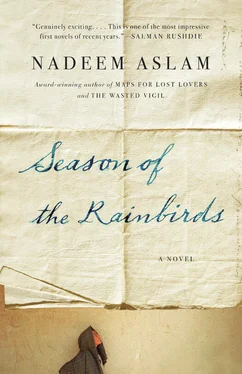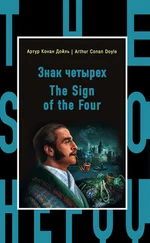Uncle Shujahat doesn’t like toys. He takes our dolls and masks from us, breaks them in two, and then hands them back. He says images of God’s creations are not allowed in the house, not while he’s visiting .
The servants arrive for work in the middle of the morning. The homes where children don’t have to be sent to school — and, therefore, the day’s chores can begin immediately — are dealt with by them before our house. The first sounds of the day have vanished by this time: the bell of the candy-floss maker, Bibi-ji, reciting the Qur’an on the veranda, the ‘aa … aa … come … come’ of the dove-fancier who waves a bamboo pole, with its red ribbon, at his doves. Bibi-ji has long since harvested today’s motya blossoms — before the rising sun could take away the fragrance — and fastened them into a garland for her hair .
With a pack-animal-like stampede, the servants begin their work; putting us to flight with the merciless swish of the linen, the beating of the rugs, the arcs from the hose-pipes above our heads, the spreading — like a flapping of wings — of the mats for preparing vegetables, the stubborn dusting and the obstinate sweeping. The air becomes charged with violence. The legs of the rope cots are taken out of the bowls of water — dead insects float on the surface of the stale water — and the milky fishbones are collected from the rims of last night’s dinner plates .
During the afternoon hours the women sit on the cool screened veranda and talk amongst themselves. A young mother asks what the scarlet pimples on the newborn’s upper arms could be. Smallpox, replies the eldest, and advises that the child be put in quarantine. The cook explains how to catch out a vendor who is trying to pass off tortoise’s eggs as hen’s. Someone else instructs that vegetables that grow beneath the surface of the earth should be cooked with the lid on; and those that grow above, with the lid off. While they sit on the darkened veranda, we swim about in the sunlight of the courtyard, burning with magnifying glasses the insects that have been sucked into the pedestal fan. Occasionally, we have to stop and look up: the adults are referring to our world: which one of us had smiled at nine weeks old, under which bush a dead yellow-striped snake was found one winter, the story of a schoolboy who got left behind, locked in, in his school over the summer holidays; how he ate chalk and paper and left tearful messages on the blackboard; and what happened when his body was discovered in September. We move closer to the veranda, pretending all the while to be interested only in our games — busy examining the pieces of coral trapped inside the marbles, waiting for the rosebuds inside the old necklace beads to open, discussing the inverted tears floating in the paperweights stolen from the study to add to our collection of glass spheres .
With the first call for the afternoon prayers this lazy calm comes to an end. The house is plunged once again into energetic activity. With an ‘up, O mortal’ each, the women pull themselves upright and disappear into the rooms. It’s time for us to walk the two blocks to the mosque for our Qur’anic lessons. Beads and sticks and dolls are taken from our hands and we are coaxed into remembering where we left our scarves yesterday .
The street is still shut when we step into the molten-gold atmosphere of mid-afternoon. The houses face each other across the passages like armies on an ancient Arabian battlefield. The hot air carries the noise of inaudible rattles. We narrow our eyes against the glare. Beating their wings, the birds too are leaving the trees for the mosque. The leaves hang like limp hands from the branches. We try to think of the cool blue river and, turning around, glance towards where the river wets the horizon. But the river, too, seems helpless before the insanity of the sun, lying like an exhausted lizard at the end of the street .
We walk past the house with the blue door. It has been made clear to us that we are to walk quietly by this house, never accept an invitation to step inside, never return the smile of the woman of the house, nor glance at the old man who sometimes looks out of the upstairs window; at our peril are we to be tempted by the flowers lying under the eaves, or by the figs that the storms shake loose. But our shadows dare each other. One of them is foolish enough to climb on to the doorstep but is pulled away just before it can reach the door bell .
And what might the penalty be for disobedience? We round the corner and fear all but suffocates us, an intense streak of fear that is not easy to extirpate. Recumbent under the arch of a portico the blind woman takes her siesta. Wrinkles gouge her face and rags of every colour are wrapped around her body. Her eyes, though bereft of vision, radiate a feral inhumanity. A gnarled right hand, palm upward, lies on the cement floor, while the other rests — permanently, we believe — on the shoulder of a little girl. The girl’s thicket-like hair stirs and her eyes watch us vacantly when we enter her field of vision. Set alongside the air of limitless danger that attends the old woman, the girl appears helpless — as helpless as the sparrow’s bote that fell out of its nest last spring. All day long the girl guides the old woman through the streets, begging. We drag our inquisitive shadows towards the mosque, eyes downturned. A kite wails overhead .
The dangers of the street are counterpointed by the calm firefly-like presence of the cleric’s wife. Her smile casts a delicate spell. She sits before us and we recite for her from our Qur’anic readers. Each reader is one-thirtieth of the Qur’an. The language is alien to us — we have not been taught the alphabet — but we have learned the shapes of the words by heart. The cleric’s wife gives our old readers new shiny greeting-card bindings. We wait by her side as she stitches a tattered reader inside a camel-and-bedouin-beneath-a-crescent Eid greeting, or inside a pair-of-doves wedding invitation. Sometimes she polishes her wedding ring with ground turmeric .
On the wall behind her is a calendar which shows the whole of Ramadan in red and both the Eids in gold. Next to the calendar is the pendulum clock; it is as ornate as a woman’s brooch. We wish for six o’clock never to arrive, for it never to be time for us to leave here .
Perhaps if we pray hard enough …
The clock strikes six, the hands divide the clock’s face into two half-moons. The cleric’s wife offers us one last exultant and forgiving smile. We kiss our readers and slip them into satin envelopes. Our shoes are set in rows at the edge of the vestibule, like boats at a Bengali ghat. The streets are full of inky shadows. But before we leave there is a quarrel. A combed-out flourish of the cleric’s wife’s hair has been found on the floor and we have to settle who gets to keep it between the pages of their reader .
Every day during the last hour before sunrise Maulana Hafeez went into the mosque to say the optional pre-dawn prayers. In the isolation and deep silence of the mosque he abased himself before God — bent his body at the waist, straightened and bowed. Afterwards, as sunrise and the time to make the call for the first obligatory prayers of the day approached, he rolled out the ranks of mats that stood leaning against the walls and, working methodically down the length of the hall, placed a straw skullcap and a rosary at the head of each mat. Not many men came to the mosque at dawn but Maulana Hafeez always spread out every mat, covering the entire floor of the hall, setting each place with meticulous care. At around eight o’clock, when the shops along the side of the mosque building were being opened and schoolboys in slate-grey uniform hurried down the narrow street, he returned home to breakfast and slept until noon.
Читать дальше












